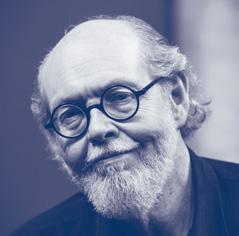
5 minute read
RUTH EASTON NEW PLAY SERIES
RUTH EA STON New Play sER IES
Marisela Treviño Orta observes actors reading her play December during the 2019 Ruth Easton New Play Series. Photo by Becca Dilley
Advertisement
Now entering its 16th year, the Ruth Easton New Play Series is evolving, offering deeper development opportunities than ever before. The five featured Core and Affiliated Writers will work with teams of renowned artists, hand-selected by the playwright, to workshop their new plays over a 30-hour development process: a 25% percent increase from years past. Made possible by the support of the Ruth Easton Fund of the Edelstein Family Foundation, this season’s expanded program gives playwrights the greatest of gifts: more time, more space, and more support to radically experiment. These fearless new plays will be showcased online, completely for free.

Over half of the plays developed through the Ruth Easton New Play Series have gone on to full productions around the globe. Reserve your ticket now at pwcenter.org; see the future of theater.

The staffing of the workshop, the mechanics of rehearsal, the processing of rewrites, and the emotional/ psychological care and feeding was a wonder to experience. The care AUTHOR AUTHOR received has allowed us to make it much more the play it wants to be, and a huge amount of credit is due to the Playwrights’ Center.
—Core Writer Jeffrey Hatcher on his 2020 Ruth Easton New Play reading of AUTHOR AUTHOR, co-written with Sandra Struthers
NO CURE
by Jake Jeppson Core Writer

Wednesday, Dec. 9 at 7 p.m.
Two lonely souls meet. They fall in love. They dance to Leonard Cohen's "Ain't No Cure for Love." Turns out, there ain't no cure for terminal cancer, either. In this tender, unflinching play, Jake Jeppson offers a deeply personal portrait of one family's experience with the two big things that can't be cured.
From Jake: In America, when people get diagnosed with cancer, their community often says, "They're a fighter—they're going to beat this thing." But that fighter mentality can deprive us of seeing one another and being present as we face the end. I hope that my work sends audiences home not quite able to articulate what they think, but feeling stuff in their body. If I can interrupt all those subconscious programs running in our brains all the time, then I'm happy.
GETTING THERE
by Dipika Guha Affiliated Writer

Wednesday, Jan. 13 at 7 p.m.
College best friends Kai and Julie are due to head back to New York after a miserable vacation in Paris when things come to a head pulling them apart. Kai meets Radha and Anissa—a sophisticated French couple in a life changing moment, while Julie meets Ira—a woman deep in a war against herself. Twenty-four hours later no one’s life is the same. Getting There is a lyrical, funny, and philosophical play about love, and what it means to come home."
From Dipika: Getting There was inspired by the work of Maggie Nelson. I wanted to write a play that was also a kind of meditation on love, aging and solitude. What emerged was this queer love story—five interconnected lives and three imperfectly perfect days in Paris.

Meghan Kreidler as Volina in Betty Shamieh's Malvolio, during the February 2020 Ruth Easton New Play Series. Photo by Paula Keller
THIS MUCH I KNOW
by Jonathan Spector Core Writer

Wednesday, Feb. 3 at 7 p.m.
A psychology professor's search for his missing wife launches us on a time-hopping fugue, weaving together the stories of Stalin's daughter defecting to America, the son of a white supremacist growing to doubt the beliefs he was raised with, and the secret despair of becoming an accidental killer. In This Much I Know, Jonathan Spector takes us on an explosively theatrical interrogation of how we make decisions, how we change our minds, and how much responsibility we bear for the things we do not control.
From Jonathan: I’ve been obsessed for years with Daniel Kahneman's book Thinking, Fast and Slow, and the idea that part of our brain is basically a machine for making associative connections. From the first time I read it, I had an instinct that it held some kind of dramatic potential, and that was the initial spark of this play.
PULP VÉRITÉ
by Crystal Skillman Core Writer

Wednesday, Mar. 3 at 7 p.m.
Joy, an active member of the filmmaking collective Pulp Vérité, is captured and held overseas for four years. After being released from captivity, she returns to the United States to reunite with her friends and restart her life. But when the group realizes Joy has gathered them together for the impossible— to bring her sister who is still a captive with ISIS home—their strength as a collective, youthful ideology, and commitment to the cause are shaken to the core.
From Crystal: Five years ago, I began writing a series of pieces that examined activism in the U.S. Pulp Vérité came to me as a parable that uses my training as a photographer to tell this story. With all we are politically facing in this country—the earned criticism of our place in the world internationally— Pulp Vérité is a race against time. This play unfolds and unravels in startling ways. I hope it is a call to action.
NANCY
by Rhiana Yazzie Affiliated Writer

Wednesday, Apr. 7 at 7 p.m.
Nancy is a loosely based bio on first lady Nancy Reagan who is a descendant of Pocahontas, and the story of a Navajo mother and daughter, Esmeralda and Jacqueline. While Nancy tries to control the future through astrology and New Age-ism, Esmeralda fights nuclear waste storage on her homelands and while her daughter develops a debilitating anxiety disorder. The story details how internalized racism, skin color, misogyny, and economic mobility create classism and racism inside tribal communities, revealing how some become gladly complicit with white supremacy when it benefits their own desires.
From Rhiana: While I was doing research for my American Revolutions Cycle play, I found out that Nancy Reagan is a descendant of Pocahontas. I couldn't resist jumping into this strange history to create a story that shows how lucrative Native ancestry can sometimes be in the proximity of whiteness.






